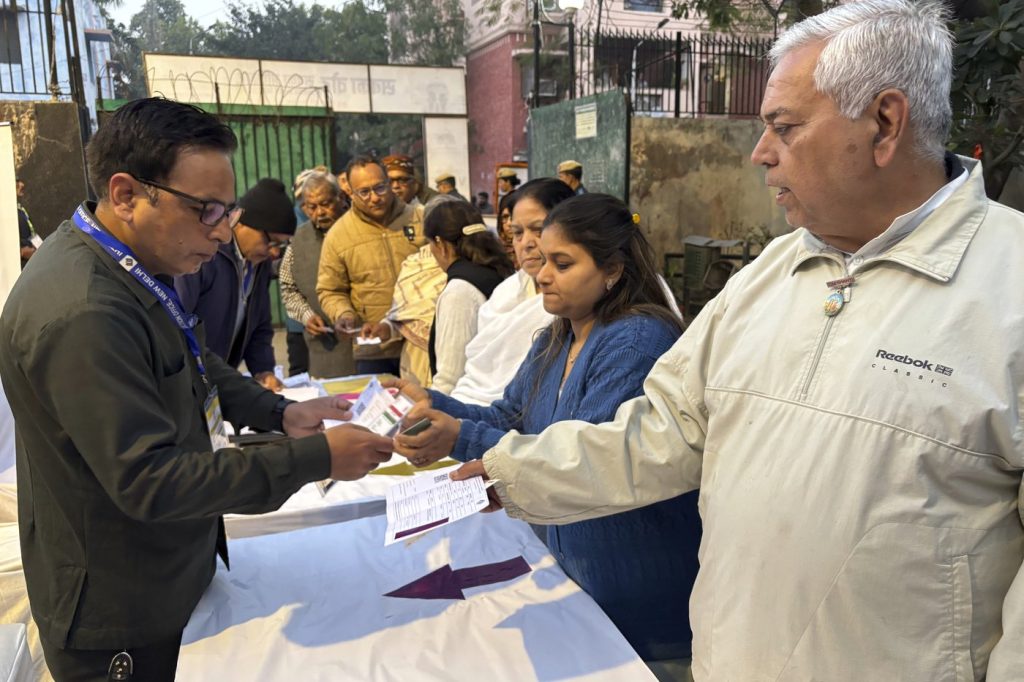NEW DELHI (AP) – On Wednesday, thousands of voters cast their ballots in a significant state legislature election in India's capital, New Delhi. The election is marked by a contest between Prime Minister Narendra Modi's Bharatiya Janata Party (BJP) and the Aam Aadmi Party (AAP), led by Arvind Kejriwal. This election is crucial as the AAP has maintained a stronghold on the region for over a decade, following significant victories in the previous elections.
On a cold winter morning, voters made their way to polling booths to participate in the electoral process. Key figures of the AAP, including Manish Sisodia, engaged in spiritual practices by offering prayers in a temple before heading to vote. The BJP is eager to unseat the incumbent AAP, aiming to capitalize on recent challenges faced by Kejriwal and his party.
The AAP previously achieved a landslide victory in the 2020 elections, securing 62 out of 70 seats, while the BJP managed only eight, with the Congress party failing to win any seats. The AAP's triumph was also evident in the 2015 elections, where it claimed 67 seats against the BJP's three. Both Modi and Kejriwal have campaigned extensively, presenting plans to improve government schools, offer free health services, and provide financial support to underprivileged women.
The voting process concluded later that day, with results expected to be announced on Saturday. Approximately 15 million residents of New Delhi were eligible to vote in this election, which has been deemed competitive. Political commentator Arati Jerath noted that while the AAP has previously dominated the political landscape, this election could present a tighter race.
New Delhi, with a population exceeding 20 million, operates as a federal territory, where the BJP has struggled to secure victories for the past 27 years despite having a considerable support base. Compounding the challenges for Kejriwal's AAP is the recent graft allegations surrounding him and other party leaders in a controversial liquor license case. These allegations have raised questions regarding Kejriwal's once-untarnished anti-corruption reputation.
In a notable development, Kejriwal was arrested last year along with two senior leaders of the AAP, facing accusations of accepting bribes from liquor distributors. The AAP leaders have vehemently denied the allegations, characterizing them as a politically motivated conspiracy. Eventually, the Supreme Court granted bail to Kejriwal and his party members, allowing them to return to political activities.
Since losing the Delhi government to the Congress party in 1998, the BJP has not regained power in the capital. The party's recent success in winning two state elections, in Haryana and Maharashtra, has provided a glimmer of hope. Modi’s party anticipates benefiting from the recent federal budget, which offers tax cuts to the middle class—one of its key demographics.
As the election unfolds, opposition parties have condemned Kejriwal’s arrest, claiming that the Modi administration is misusing federal investigation agencies to intimidate and weaken political rivals. The AAP emerged in 2012, founded by Kejriwal, who rallied public support against corruption stemming from the Congress party's governance, which was marred by scandals.
The BJP's historical context in Delhi, where it has not won since 1998 and has faced repeated defeats against the AAP, sets the stage for a critical electoral battle. After the landslide elections in 2015 and 2020, the AAP's performance in 2025 will be pivotal in determining the future political landscape of the capital.










